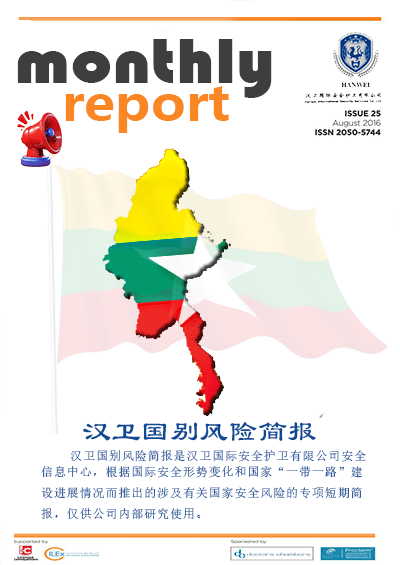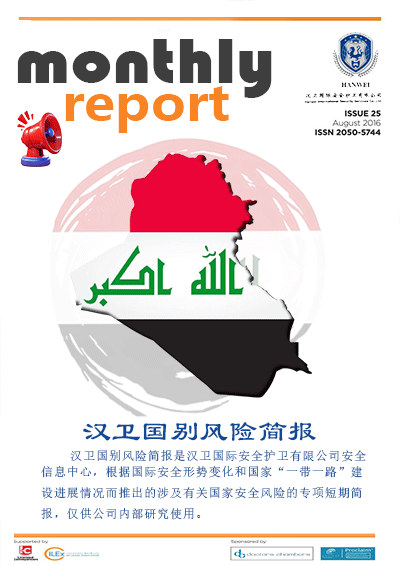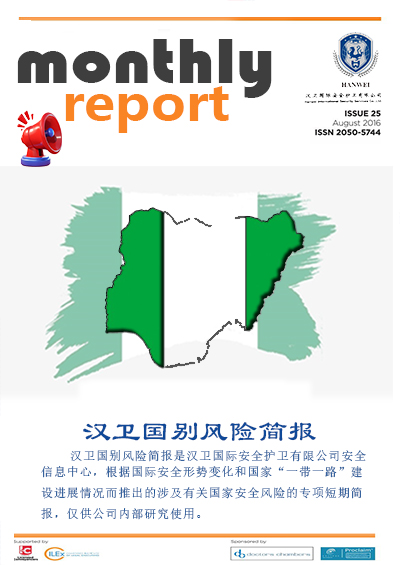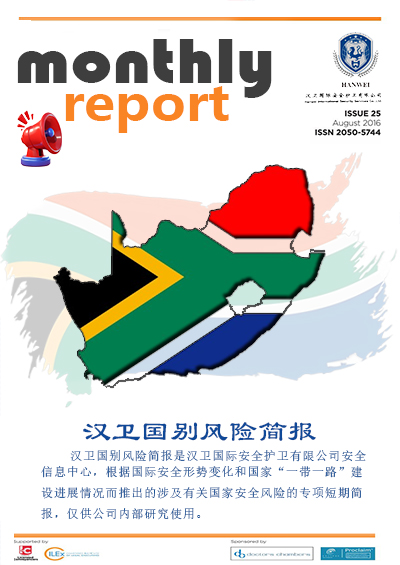Overview of Iraq's Security Situation in December
Researcher No. 006
According to the monitoring report of the security officer of Hanwei International in Iraq and related media reports, our company has obtained information on nearly a hundred various types of security incidents. Among them, armed conflicts/armed attacks, terrorist attacks, protests, demonstrations/strikes both at home and abroad have had a significant social impact this month. This report mainly analyzes important social security incidents with significant social influence that may threaten the lives and property of Chinese citizens in Iraq, thereby serving as a warning to Chinese citizens: When you are away from home, safety comes first!
Hanwei International analysis suggests that the overall security situation in Iraq this month remains far from optimistic, and the unstable situation in the surrounding areas has made things even worse. By the end of this month, the situation in the Middle East has continued to deteriorate and conflicts have been escalating. The Palestine-Israel conflict, the Lebanon-Israel conflict, the Iran-Israel conflict and the recent Syrian conflict, etc., Israel's military operations and expansionary behaviors in the Middle East have drawn strong condemnation from the international community and exacerbated regional conflicts. Based on last month's statement that "Israel threatened to launch large-scale attacks on targets in the Iraqi mainland" and this month's occupation of the military buffer zone and nearby land between Iraq and Syria and other remarks and actions, it cannot be ruled out that its target might be directed at Iraq in the future. Meanwhile, the ISIS terrorists, who have been on the rise, have taken advantage of the situation to invade. Their activities, reserves of materials and ammunition, as well as their strike capabilities within Iraq are all on the rise. This month, the political and economic situation in Iraq was relatively stable but faced some challenges. The mastermind behind the "wiretapping case" was sentenced to prison, and large-scale protests and strikes broke out in multiple government departments.
One is that Iraq is facing political and economic challenges.Politically: On December 9th, the Kark Criminal Court in Baghdad, the capital of Iraq, sentenced Muhammad Juhi, the mastermind behind the highly publicized "wiretapping case" in the prime minister's office, to four years in prison. He was accused of engaging in illegal activities such as wiretapping important political figures, false propaganda, and forging documents. It is said that Mohamed Juhi is a close ally of Iraqi Prime Minister Mohamed Shia Sudani and one of the core figures of the network. During the investigation, Zhu Xi had admitted to accepting the prime minister's instructions, but he overturned his own remarks in court, making the overall case more complicated. The case has sparked intense debate in Iraqi political forums, with the focus centering on the legitimacy of the Sudani government's governance. On December 8th, the legislative deadlock in Iraq reached its climax as the House of Representatives failed to convene its 20th regular session to vote on key laws such as the Personal Identity Law and the General Amnesty Law. Independent lawmaker Mohamed Al-Ziadi said in an interview, "During the extended legislative period, the House of Representatives failed to pass important and controversial laws." He warned, "If the legislative role of the House of Representatives remains stagnant after the holiday and in the next legislative period, we will collect signatures demanding an early election and ending this parliament." The Iraqi parliament is under threat of dissolution. Economically: At the beginning of this month, Iran decided to significantly reduce its natural gas supply to Iraq. Its natural gas exports dropped sharply from 25 million cubic meters per day to 6 million cubic meters. This unilateral and sudden reduction led to a loss of approximately 6,000 megawatts of power generation capacity in Iraq's national power grid. On December 1st, according to internal government sources, three large power stations in Iraq were shut down due to reduced Iranian natural gas supplies, resulting in a corresponding reduction in power supply time in Baghdad and other central provinces. Among them, the Diyala Province was one of the provinces most affected. The power supply time in this province has been significantly reduced, leaving industrial and residential areas "paralyzed". Operators have suffered additional losses due to delivery delays and the purchase of diesel engines. At the same time, the reduction in workload has forced property owners to lay off staff, further exacerbating environmental instability.
Second, large-scale protests, demonstrations and strikes have broken out in many provinces of Iraq this month.The "British oil giant" is being boycotted. This wave was mainly concentrated in Sulaymaniyah Province in northern Iraq, Baghdad Province in central Iraq and Basra Province in southern Iraq. On December 1, 2024, a larger-scale wave of protests and strikes broke out in Sulaymaniya City, Sulaymaniya Province, Kurdistan Region, Iraq, due to delayed wage payments and newly issued administrative decisions. The protests involved multiple public sectors including healthcare, education, and the government, seriously affecting the continuous and normal operation of public services. Protesters and strikers are calling on the Kurdistan regional government to resolve the issue of wage payment as soon as possible, re-examine the current administrative policies, and prevent the complete paralysis of multiple government departments, which could further deteriorate the situation. Basra Province: As of the end of December, protesters in the Al-Sadiq area in the northern part of Basra have been conducting peaceful demonstrations for three consecutive weeks. The protesters demand that the government build schools, repair infrastructure such as streets, and provide job opportunities, but these reasonable demands have been ignored by the government. The leader of the protest movement, Sheikh Mesam Mansouri, said that the demonstrations would be escalated, including the closure of the Basra oil field facilities. Baghdad Province: On December 30th, dozens of people held a demonstration in front of the Ministry of Oil building in the capital Baghdad, protesting against the deterioration of the power situation caused by the previous disruption of Iranian gas supplies and demanding improvements in power supply and power reform. Bp: As a significant foreign investor in Iraq's oil industry, BP has faced protests from employees of its Basra branch. The protesters have closed the company's gates in the Rumaila oil field, demanding the same treatment as employees of other oil companies and a profit dividend for the period from 2021 to 2024.
Thirdly, the situation in Syria is unstable and the security along the Iranian border has escalated.On November 27th, fierce conflicts broke out between Syrian armed factions and the Syrian government forces in the western towns of Aleppo, and then they took control of several towns and areas in Idlib. On November 30th, it took full control of Idlib Province and occupied several township areas including Marat Numan and Han Shehong. The Syrian government forces said that the current conflict is the most intense escalation since 2020. During the regime change in Syria, external forces intervened strongly, and their "power" even spread to Iraq. Israeli military operation: As the Syrian opposition took over power, Israel announced its invasion of Syria, approaching the Syrian capital Damascus and expanding the demilitarized buffer zone along the border with Syria. The most crucial point is that the illegal occupation of the military buffer zone and nearby land between Iraq and Syria, based on the previous "threat of declaration of war" against Iraq, is this move a continuation of "provocation"? Turkey's direct entry into the war: On December 24th, the Turkish army directly entered the war to support the "Syrian National Army" in launching attacks on Kurdish forces, and the Kurds suffered successive defeats. Will this directly affect the counterattack of the Kurdistan Workers' Party in Iraq? U.S. military deployment: During the current Syrian conflict, the U.S. military operations in the Middle East have escalated once again. It has dispatched the USS Truman aircraft carrier strike group and other air and sea forces, and is preparing to increase its troops stationed in the Middle East. Will the escalation of the US military operation this time trigger a strong reaction from the "Islamic Resistance Group" in Iraq?
Fourth, ISIS terrorists both inside and outside Iraq are "stirring up trouble".On December 1st, the Iraqi Council of Ministers of National Security held an emergency meeting on the situation in Syria. Prime Minister Sudani clearly instructed that "continuous attention must be paid to border security, intelligence work strengthened, and the monitoring of terrorist organization activities within Syria intensified." In the 2014 Syrian conflict, which is very similar to this one, the extremist group "Islamic State" (ISIS) rose to power. In particular, the Yazidi community in Iraq was brutally attacked by ISIS, and large areas of Nineveh Province, including Sinjar, were severely damaged. Therefore, all these areas are currently the top priorities for prevention. On December 6th, Basim Awadi, the spokesperson of the Iraqi government, announced that Iraq has closed its border with Syria. Meanwhile, Awadi is worried that during the extremely volatile period in Syria, will the Syrian Al-Hol camp, which holds thousands of IsO-related personnel, be affected? The prisons in the Al-Hol camp pose a significant threat to Iraq. On December 10th, an Iranian official warned that 11,000 ISIS fighters who were training in Syria might attack Mosul in Nineveh Province, Iraq in the future. This month, Iraqi federal forces and Kurdistan regional forces, through intelligence sharing and joint air strikes, have eliminated 150 ISIS members and destroyed a key terrorist ambush network. A large number of terrorist activity trajectories have been found in provinces such as Wasit, Salahuddin and Kirkuk. On December 1st, the Iraqi counter-terrorism forces, in collaboration with the security agencies of the Kurdish Autonomous Region, arrested an ISIS member responsible for manufacturing explosives and toxic agents in Wasit Province. On the 6th, Iraqi intelligence forces killed a senior leader of ISIS in Salahuddin Province. On the 12th, the Iraqi Joint Operations Command carried out air strikes on eight ISIS hideouts in the Hamlin Mountains within the operational zone of Kirkuk Province. On the 13th, a suicide attacker was killed while attempting to enter a restaurant in the southern part of Kirkuk Province to detonate himself. On the 20th, a source from the security department reported that an ISIS flag was raised in a village in Kirkuk Province, and then the village was sealed off. On the 25th, an F-16 in Iraq killed five ISIS armed terrorists in the Hamlin Mountain area of Kirkuk Province.
It is recommended that Chinese-funded enterprises and individuals in Iraq take the following precautions::First, keep a close eye on the country's political and economic information and make relevant preparations in advance.This month, both the politics and economy of Iraq have experienced certain volatility within stability. Especially this month, the cut-off of natural gas supply from Iran has led to a significant decline in Iraq's power generation capacity and extremely unstable power supply. This not only brings many inconveniences to the daily lives of residents but also seriously affects the normal operation of many factories and enterprises. In this situation, it is recommended to make emergency preparations for power supply and at the same time guard against the adverse social impacts brought about by multiple job losses and salary cuts due to rising operating costs, such as protests, demonstrations and retaliation.Second, pay close attention to official safety information such as "Travel Risk Levels and Safety Reminders" on the Chinese Consular Service Network for Iraq, and enhance your awareness of safety precautions.At present, the security situation in Iraq is extremely severe and complex. Israel is eyeing it greedily, and ISIS militants are making a comeback both at home and abroad. The border forces of Iraq are on high alert. It is suggested that Chinese citizens be reminded to reasonably assess the working environment and refrain from traveling to Iraq for the time being unless necessary. They should be cautious about traveling to 13 provinces including Karbala and Vasit, and avoid other regions of Iraq for the time being.
If you plan to work in Iraq for a long time, please apply for a work visa in advance.According to the "Law on the Residence of Foreigners in Iraq", foreign citizens holding travel visas or visit visas are not allowed to engage in paid or unpaid work in Iraq. If one goes to work in Iraq with a non-work visa, they will face penalties such as paying fines and detention. At the same time, abide by the regulations on entry and exit administration and enter and exit the country legally. Israel prohibits foreigners from entering the country with passports holding Israeli visas. At the beginning of this month, the management of Kurdistan Airport in Iraq found an Israeli visa in the passport of a Chinese traveler. According to relevant Iraqi regulations, they refused his entry and deported him back to his place of departure.




